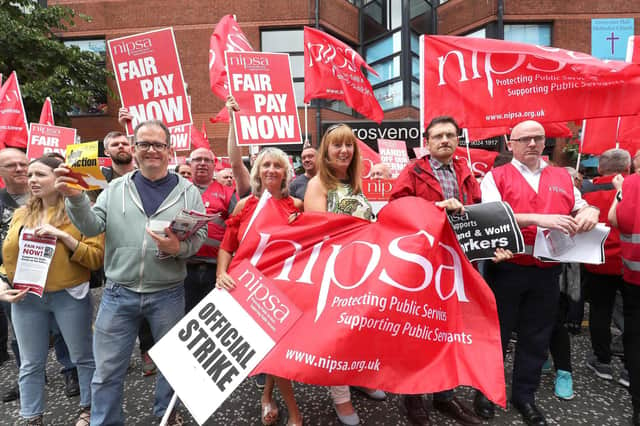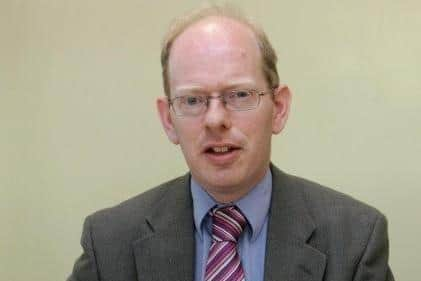Esmond Birnie: Immediate strike crisis is obscuring the fundamental question: what sort of public sector do we want in the future?


Tragically good intentions may be producing a gigantic act of collective self-harm.
Will the strike work?
It is said that the money (or about £580m) is on the table to meet most of the immediate wage demands.


Advertisement
Hide AdAdvertisement
Hide AdIt is less clear if the current package represents a sustainable means to fund higher public sector pay year on year into the future.
The great danger is that the immediate crisis is obscuring what is the fundamental question: what sort of public sector (and, indeed, private sector) do we want in the future?
Importantly, Northern Ireland (NI) has made three public choices: first, to have a larger public sector than GB; second, to have lower levels of regional taxation and charging than GB; and, third, to try to maintain pay parity with GB.
The third of these choices is hard to reconcile with the first two.
Advertisement
Hide AdAdvertisement
Hide AdThere is a sense in which we have been here before. In late 2019 public pressure to restore pay parity for nurses was a big push behind the restoration of Stormont. With hindsight we can see the New Decade New Approach did not provide a sustainable basis for funding devolution in NI.
What about the morality of strikes?
Let’s apply a simple but powerful moral principle: that we should consider what consequence our actions have on other people and ask whether such consequences are ones we would ourselves wish for.
This so-called “Golden Rule” approach is referred to in Christianity and about 12 other major faith or ethical traditions. A striking health care professional, for example, should ask how they might feel if it was their own operation which was being postponed.
There is some statistical evidence that trade union membership boosts the wage level of members compared to non-members. It is much less clear that trade unions raise wages in general. It is therefore possible that trade unions raise the wages of some at the expense of others. Unions may re-distribute income but not necessarily in the way that their proponents would argue.
Advertisement
Hide AdAdvertisement
Hide AdIn a sort of Charles Dickens or Karl Marx world, perhaps two hundred years ago, trade unions may have performed a valuable role in counter-balancing the monopoly power of large companies which was being used to keep wages at subsistence levels. Economic conditions have changed since then. In any case, many of today’s strikes are in the public sector.
The efficacy and desirability of strikes in the public sector is particularly questionable. Individuals are quite entitled to argue that more government funding should be devoted to, say, the NHS or railways in GB. Such individuals need to recognise that this will probably imply higher taxes.
Surely the political arena, the winning of elections, is the best way to engineer changes in amount and allocation of public spending.
Strikers may claim that the main purpose of their strike activity is to “save” the NHS or railways in England or public transport here in NI. What they are really saying is that they don’t like the outcome produced by the political system and think that the disruption created by strikes should be used to enforce an alternative outcome.
Advertisement
Hide AdAdvertisement
Hide AdIn some very exceptional circumstances general striking may be a legitimate tool to prevent some very bad outcome (eg the strike by Amsterdam rail workers in 1941 to stop transports to the death camps) but our current disputes about the future of healthcare or transport should be resolved in the domain of party politics.
Of course, some will say these strikes really are a last resort: we need to use them here in NI because of our broken political system.
Even if that system is in some senses broken does that really justify the further confusion that striking will introduce?
A collective act of self-harm, a sort of burning the house down to signal for help, seems like a pretty extreme measure.
Advertisement
Hide AdAdvertisement
Hide AdThere is no guarantee that either the secretary of state or the political parties will respond in the way some people want.
In any case, do we really want a regional government (whether Stormont or devolved) which can be blown hither and thither by strike action?
Incidentally, the reason why the NI political parties are universally pro-strikes is that they think they can continue to pass the buck regarding public sector pay policy to the UK government. This is one of a number of forms of collective political irresponsibility which does not bode well for the future.
In 1974 prime minister Edward Heath lost a general election based on the slogan “Who Governs Britain?”
Advertisement
Hide AdAdvertisement
Hide AdIt is looking increasingly unclear who really governs NI but it is doubtful if Thursday’s general strike will bring a sustainable improvement.
Dr Esmond Birnie is senior economist at Ulster University Business School